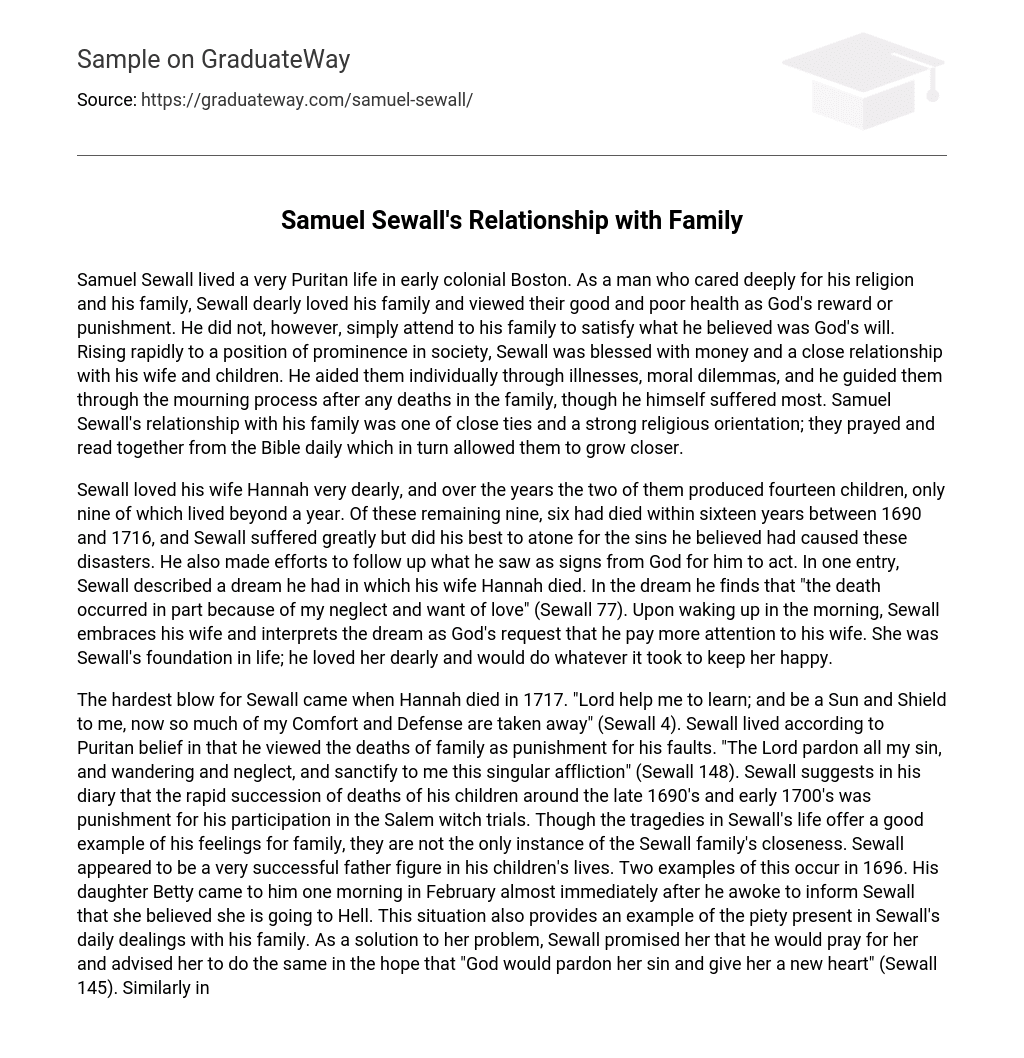Samuel Sewall was a devout Puritan who lived in early colonial Boston. He had a strong love for his religion and his family, believing that their well-being reflected God’s favor or judgment. However, Sewall’s care for his family was not just out of duty; he had great wealth and a close bond with his wife and children. In times of illness and moral dilemmas, he personally supported them and helped them through the grieving process when they lost loved ones, despite facing his own personal suffering. The foundation of Sewall’s familial relationships was rooted in their shared religious convictions, as they regularly engaged in daily prayers and Bible readings that strengthened their connection.
Sewall’s deep love for his wife Hannah was evident throughout their marriage. Despite facing the heartbreak of losing five of their fourteen children within the first year, Sewall remained dedicated to his family. The pain of losing six more children between 1690 and 1716 weighed heavily on him, leading him to seek redemption for what he believed were his sins. He fervently followed signs from God, believing they were messages for him to act upon. One such sign manifested in a dream where Hannah died due to Sewall’s neglect and lack of affection. This dream prompted him to reflect on his actions and strive to improve his attentiveness towards his beloved wife. Hannah was his pillar of strength, and Sewall was willing to go to any lengths necessary to ensure her happiness.
Sewall faced a tragic loss when Hannah passed away in 1717. In his sorrow, he prayed for guidance and comfort, recognizing that he had lost much of his support and solace. Being a devoted Puritan, Sewall believed that the deaths of his family members were a result of his own failures. Wanting to be forgiven, he sought pardon for his sins and negligence, hoping to find purpose in this challenging trial. His diary indicates that the deaths of his loved ones during the late 1690s and early 1700s, including those related to the Salem witch trials, were somehow linked to his involvement in those events. While these tragedies demonstrate Sewall’s profound love for his family, they also highlight their close bond.
Sewall also proved to be an attentive father figure in the lives of his children. For instance, when Betty came to him one morning expressing fears of damnation, Sewall responded with devoutness and compassion. He assured her that he would pray for her and encouraged her to do the same in order to seek God’s forgiveness and find renewal. Similarly, when Sam Jr., Sewall’s son, struggled to sleep due to a sermon emphasizing the consequences of idleness, he turned to Sewall for guidance. Recognizing his son’s distress, Sewall sympathized with him and offered advice.In general, these examples demonstrate Sewall’s commitment to both God and family during the different obstacles they encountered. He perceived his work as fruitless and found more fulfillment in being with his loved ones. To tackle the issues, he met with Samuel Checkley, who had been educating Sam Jr., in an attempt to resolve them. Despite Sam Jr.’s continued distress, Checkley extended an invitation for him to frequently visit his home in hopes of finding a resolution. As a last resort, Sewall and his son privately prayed for God’s guidance in discovering the suitable career path for Sam Jr.
Sewall’s compassion extended beyond his immediate family. He formed a close bond with his father-in-law, John Hull, and inherited his business when Hull passed away in 1683. This inheritance made Sewall one of the wealthiest individuals in eighteenth century Boston, enabling him to provide for his numerous children and offer meals to both family members and friends whenever the need arose. Sewall’s diary contains records of his interactions with his siblings, Stephen, Jane, and Mehitable, which took place either at his own residence or occasionally at theirs. In one entry, he mentions that “Brother and Sister Gerrish (Moses and Jane) lodged here last night” (Sewall 81). They would pray together and offer support during times of grief, such as when Sewall experienced the loss of his children.
In his diary, Sewall’s unwavering devotion to his family is evident. He would go to great lengths to ensure their happiness, as he believed that his actions towards them were directly rewarded or punished by God. If he noticed his children straying from the Puritan way of life, Sewall would intervene and guide them back through activities like reading the Bible, attending mass, fasting, and praying. His strong adherence to his Puritan upbringing heavily influenced how he interacted with others and behaved. Sewall saw any good fortune as a reward from God and any misfortune as His wrath. He viewed the happiness in his family life and prominent position in Boston as manifestations of his piety. Whenever trouble arose for his children, Sewall turned to reading the Bible or offering prayers as solutions. Despite whatever underlying motives there may be, Sewall effectively maintained close relationships with his children, siblings, and friends. Even though he faced significant personal losses, Sewall managed to recover from each setback and provide support during difficult times. Ultimately though, Sewall’s ultimate accountability was always to God – despite relying heavily on Hannah (his wife) and taking pride in their children.He consistently demonstrated actions that he believed were in accordance with God’s will. Whenever he made an error, he sought forgiveness through prayer and fasting. Although Sewall valued his family and enjoyed a successful life, his utmost priority was to please God as best as he could.
The book “The Diary and Life of Samuel Sewall” is edited by Mel Yazawa. It was published in New York by Bedford in 1998.





